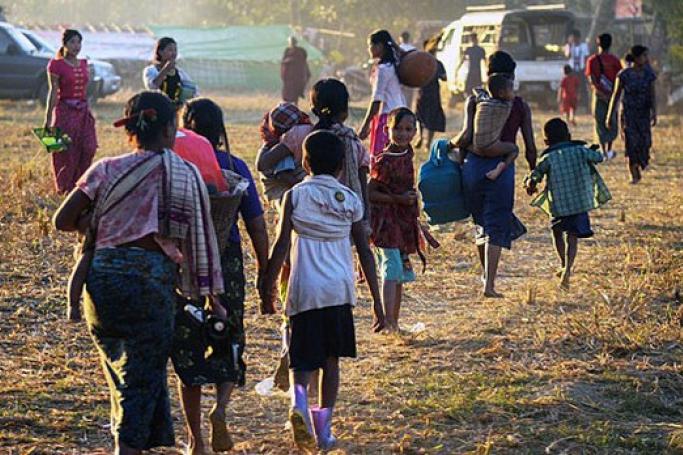Conflict between the Myanmar Armed Forces (MAF) and various groups, including Ethnic Armed Organizations (EAOs) and People’s Defence Forces (PDFs), continues in many parts of the country, with fighting particularly intense in northern Shan, Rakhine, Sagaing, Chin and Mandalay, UN OCHA reported on 23 November.
In Rakhine, armed clashes have again escalated in Pauktaw Township, where more than 20,000 people have been newly displaced to safer locations since mid-November. Access here is heavily constrained.
As of 22 November, there are nearly 335,000 people in multiple states and regions who have been newly displaced as a result of the escalation of fighting since 27 October, in large part due to the resistance’s Operation 1027. More than 2 million people are now displaced nationwide.
Key transport routes in townships with active fighting have been blocked both by the MAF and EAOs, restricting people’s movements to safer locations, as well as hampering humanitarian access. In addition to Lashio and Loikaw, the airport in Kale is now closed.
Despite insecurity, access and telecommunication challenges, small-scale provision of essential humanitarian assistance to affected people continues where possible using a variety of flexible approaches.
UN OCHA notes that while the US$1 million from the Myanmar Humanitarian Fund is being disbursed to local actors to support those responding to emerging needs in northern Shan, needs in the Northwest, Southeast and Rakhine are increasing by the day and require immediate response. Urgent additional donor support is critical given the 2023 Humanitarian Response Plan remains severely underfunded with only 28 per cent of requirements received this year.
EXPANDING FRONTS
Intense hostilities continue between the MAF and various armed groups, including EAOs and PDFs, across multiple states and regions. Nearly 335,000 people have been newly displaced within northern and southern Shan, Kayah, Rakhine, Chin, Sagaing, Mandalay, eastern Bago, Kayin, Mon, and Tanintharyi
due to the surge in conflict since late October. This displacement is creating urgent needs for immediate and ongoing support to both newly displaced and protracted IDP populations, as well as host communities. In addition, almost 200 civilians, including men, women, and children, have reportedly died and 263 others have been injured in the fighting and related insecurity.
In northern Shan State, fighting continues in several townships, resulting in significant civilian casualties (48 fatalities and 136 injuries reported). More than 320 houses and other civilian properties have reportedly been damaged or destroyed in 6 townships. As of 22 November, the number of new IDPs from the current fighting has risen to nearly 82,000 people who are now taking refuge in 141 sites across 15 townships. Most of the displaced people are staying in religious compounds including monasteries and churches, while others are sheltering in host communities, forested areas or paddy fields along the China-Myanmar border in northern Shan, as well as in Pyin Oo Lwin township in Mandalay and in Mansi township in Kachin.
UN OCHA says partners are actively delivering essential aid, including cash, food, and healthcare, to those in need, where access has been possible. Humanitarian assistance has reached about half of the IDPs however, there remains a gap in humanitarian support for some locations in Namhkan, Nawnghkio, Mansi and Pyin Oo Lwin townships due to the security situation and access restrictions. In Laukkaing township, 30,000 people, who have been displaced on the border with China, have only been able to receive minimal assistance. Partners are managing to transport some supplies to Lashio, though there is still a high unmet need for cash, food, health supplies, shelter materials, non-food items (NFIs), and dignity kits among the new IDPs.
TENSION IN RAKHINE
UN OCHA notes that intensified fighting between the MAF and the Arakan Army (AA) in Pauktaw Township in central Rakhine, has escalated since the AA's offensive on 21 November. The clashes, involving ground artillery, naval, and air strikes, have left control of the area uncertain. An artillery shell landed near a Rohingya IDP camp in Pauktaw Township without causing any casualties. Nearly 20,000 people from Pauktaw Town and nearby villages have been displaced to northern Pauktaw and the southern island, the latter of which also hosts 26,000 Rohingya IDPs from the 2012 violence who have been cut off from aid since 10 November. Approximately 100 civilians were reportedly rescued by the AA from Pauktaw town on 22 November, while around 500 remain trapped in the downtown area. Pauktaw is currently inaccessible, with entry points blocked. Urgent humanitarian and protection assistance,
including food, cash, water purification tablets, fuel, emergency healthcare, and medical supplies, is needed. There are ongoing advocacy efforts to secure humanitarian access to the newly displaced, including in Pauktaw, and resume services to those in Rohingya IDP camps.
NORTHWEST
Meanwhile, in the Northwest, armed clashes between the MAF and EAOs/PDFs have escalated since late October in 25 townships across Sagaing, Chin, and Mandalay, causing further displacement and civilian casualties. Approximately 33,000 people are newly displaced from Madaya in Mandalay, Matupi in Chin, and Kale and Taze in Sagaing, contributing to the nearly 150,000 people who have been displaced since early November. These hostilities are thought to have resulted in 60 civilian deaths, 16 injuries including children, and the destruction of 74 houses in Chin, Mandalay, and Sagaing. Reports of arbitrary arrests in Myaing in Magway and Madaya in Mandalay have been received, with fears of detainees being used as porters in military operations. Humanitarian access is hindered by ongoing fighting, roadblocks, and movement restrictions in multiple townships. Kale Airport in Sagaing closed on 21 November following an explosion the previous day, with no reopening date announced. The region faces a fuel crisis, particularly in Kale and Tamu townships, and banking issues pose additional challenges for humanitarian efforts.












